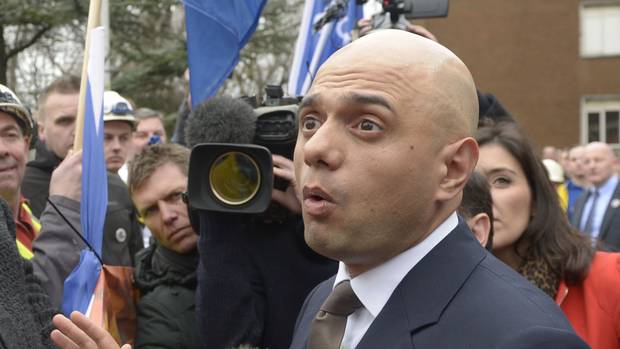China agrees to tackle steel industry overcapacity, says Sajid Javid

China has agreed to tackle its overcapacity of steel production which is being blamed for the crisis in the industry, according to the UK Government.
Talks in Brussels with countries including the Chinese were described as "constructive" by Business Secretary Sajid Javid.
He said it was the first time all major steel producing nations had come together with the industry, representing 90% of world production, to discuss the excess capacity which is crippling companies.
Meanwhile, Tata has appointed a chief executive for its UK steel business as efforts continue to find a buyer for its loss-making plants.
Bimlendra Jha, an executive member of Tata Steel Europe, takes the new post at a critical time.
He is executive chairman of Tata's Long Products business, including the huge plant in Scunthorpe, which was sold last week to Greybull Capital.
Tata revealed it had contacted 190 potential financial and industrial investors worldwide since launching its sale process a week ago.
Mr Javid said of China's involvement in the talks: "They have absolutely recognised that it is a problem of overcapacity in their country. They're committing to do something about it and I think that's a very positive step forward."
Over-production was the main issue to tackle, said the minister, adding: "I don't think anyone expects an overnight solution to that. The discussion today with all these countries coming together is something that we pushed for, and ... China's participation will help make the difference.
"With regards to Tata, the sales process - the formal process - has now begun, we're starting to be approached by interested parties. It's too early to say much about them at this stage but the important thing is, as we said all along, we will do everything we can to help with that sales process. The steel workers of Britain deserve nothing less."
Koushik Chatterjee, group executive director of Tata Steel, said: "Today's announcement by Tata Steel Europe will ensure the full focus on the vital tasks that lie ahead of Tata Steel UK.
"Bimlendra's successful experience of the process of divestment of Long Products Europe will be invaluable as Tata Steel Europe explores strategic alternatives for its operations in the UK.
"He will be supported by a team with immense operating experience of the UK business.
"To deliver greater clarity for all key stakeholders such as employees, customers and suppliers, it is important for the new team to seek all credible options in a time-bound manner."
Tata also announced the appointment of Standard Chartered Bank as an additional adviser to its sale process.
EU Trade Commissioner Cecilia Malmstrom called for "effective reform" based on sustained international cooperation to tackle the challenges facing the European steel industry.
Speaking at the Brussels meeting she said the European industry has made considerable efforts to modernise, adding: "Today it has energy efficient plants making high-tech products. It's a strong sector, with strong potential. However, today's global overcapacity is hitting the sector very hard.
"The price of steel in Europe has dropped by 40% in recent years. This is thanks to a massive surge in imports - a 25% increase last year alone - possibly because the EU's market is open.
"The situation, however, is putting hundreds of thousands of jobs in the EU at risk. It's also undermining a strategic sector with importance for the wider economy.
"Overcapacity in steel was above 700 million metric tons at the end of 2015, and new plants are set to add another 47 mmt by 2018, according to OECD analysis. Meanwhile steel consumption is expected to have declined last year.
"We are acting against unfair trade practices in response to justified complaints. And we are acting responsibly, taking into account the needs of consumers and companies that use steel.
"But we also know that this is only a short-term bandage. Healing the sector's wounds requires sustained international cooperation leading to effective reform."
Gareth Stace, director of UK Steel, said: "What we needed to see at today's meeting was an agreement by national governments to take short term, detailed actions to help address the steel sector crisis.
"However, having agreed what the problems are we appear to be no closer to finding international action to put in place solutions.
"Governments must be prepared to come together to take rapid and decisive action to ensure we have a level playing field on which to compete fairly, or they may face the prospect of seeing their steel sectors wither on the vine and die.
"This is a global problem which requires a global solution to remove current over-capacity and time is a luxury we don't have.
"In Europe we have already been through very painful restructuring and must now look to others, including China, to take the same radical action."
Roy Rickhuss, leader of the Community union, said: "Today's meeting seemed to be all about long-term challenges. While these issues do need addressing, what we need is urgent short-term action from governments across Europe and beyond to get us through the current crisis and create a sustainable future for steel."
Defence Procurement Minister Philip Dunne said new guidelines implemented by the Ministry of Defence would ensure UK steel manufacturers have "every opportunity" to bid for tenders.
During defence questions, he told the House of Commons: "The Government has undertaken a new set of procurement guidelines for steel which we have implemented through the Ministry of Defence through a combination of briefings to the Defence Suppliers Forum, undertaken by the Secretary of State, and I have written personally to the chief executives of the 15 largest contractors.
"We're cascading that through the supply chain to ensure that for future defence procurement there is every opportunity for UK steel manufacturers to bid for tenders."